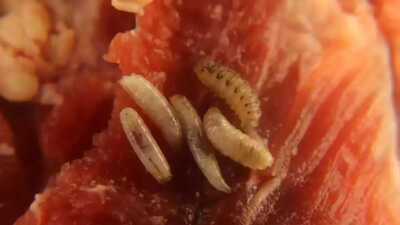A rare case of a flesh-eating parasite has become the latest unsettling health concern to make headlines in the United States. According to Reuters, the Centers for Disease Control and Prevention (CDC) confirmed that a Maryland resident who had recently returned from El Salvador was treated for New World screwworm infestation.
“The traveler returned to Maryland, got treated, and—thankfully—recovered,” Andrew G. Nixon, a spokesperson for the US Department of Health and Human Services (HHS), told Reuters in an email.
He added that CDC, in coordination with the Maryland health department, “kept a tight lid on it and confirmed there’s been no further spread—not to other people or animals.”
What is the New World screwworm?

The New World screwworm is a parasitic fly whose maggots burrow into open wounds and feed on the living tissue of an animal. The US Department of Agriculture’s Animal and Plant Health Inspection Service (APHIS) explains that these larvae “feed on the living flesh of an animal by burrowing, or screwing, into an open wound.”
Before it was eradicated from the United States in the 1960s, screwworm caused devastating losses in the cattle industry. Now, with the pest resurging in Mexico and across Central America, U.S. officials are stepping up monitoring efforts to prevent its re-entry.
Rising threat in Central America
The US Department of Agriculture reports that Panama saw livestock infections rise from “an average of 25 cases annually to over 6,500 in 2023.” Since then, screwworm has been detected in seven other Central American countries, breaking a decades-old barrier that had kept it contained to South America.
Experts warn that untreated infestations in cattle can carry a high mortality rate. “If the problem goes untreated among cattle, the mortality rate of the infestation can be high,” said Max Scott, a professor at North Carolina State University who researches pest control, in remarks to USA Today.
Despite the headlines, experts stress that the risk of widespread human infection in the US remains extremely low. Scott noted, “because people typically seek treatment quickly and the parasites don't spread directly from animal to animal, travelers aren't likely to cause the infestation to spread in the United States.”

How to stay safe
Health officials emphasize that prevention is key when traveling or spending time in affected environments. The CDC recommends the following measures:
Cover any open wound, including those from recent surgeries, piercings, tattoos, cuts, or scrapes, with a waterproof bandage when in coastal waters.
Avoid wading, swimming, or fishing in warm coastal waters if you have open wounds.
Cover wounds when handling raw seafood, including drippings and juices.
Wash hands and surfaces thoroughly when preparing seafood.
Cook seafood thoroughly, especially if you are at increased risk for illness.
Immediately clean cuts and wounds with soap and clean running water after exposure to coastal waters.
Wear clean clothes to protect your skin while in the water if you are vulnerable to infection.
“The traveler returned to Maryland, got treated, and—thankfully—recovered,” Andrew G. Nixon, a spokesperson for the US Department of Health and Human Services (HHS), told Reuters in an email.
He added that CDC, in coordination with the Maryland health department, “kept a tight lid on it and confirmed there’s been no further spread—not to other people or animals.”
What is the New World screwworm?
The New World screwworm is a parasitic fly whose maggots burrow into open wounds and feed on the living tissue of an animal. The US Department of Agriculture’s Animal and Plant Health Inspection Service (APHIS) explains that these larvae “feed on the living flesh of an animal by burrowing, or screwing, into an open wound.”
Before it was eradicated from the United States in the 1960s, screwworm caused devastating losses in the cattle industry. Now, with the pest resurging in Mexico and across Central America, U.S. officials are stepping up monitoring efforts to prevent its re-entry.
Rising threat in Central America
The US Department of Agriculture reports that Panama saw livestock infections rise from “an average of 25 cases annually to over 6,500 in 2023.” Since then, screwworm has been detected in seven other Central American countries, breaking a decades-old barrier that had kept it contained to South America.
Experts warn that untreated infestations in cattle can carry a high mortality rate. “If the problem goes untreated among cattle, the mortality rate of the infestation can be high,” said Max Scott, a professor at North Carolina State University who researches pest control, in remarks to USA Today.
Despite the headlines, experts stress that the risk of widespread human infection in the US remains extremely low. Scott noted, “because people typically seek treatment quickly and the parasites don't spread directly from animal to animal, travelers aren't likely to cause the infestation to spread in the United States.”
How to stay safe
Health officials emphasize that prevention is key when traveling or spending time in affected environments. The CDC recommends the following measures:
Cover any open wound, including those from recent surgeries, piercings, tattoos, cuts, or scrapes, with a waterproof bandage when in coastal waters.
Avoid wading, swimming, or fishing in warm coastal waters if you have open wounds.
Cover wounds when handling raw seafood, including drippings and juices.
Wash hands and surfaces thoroughly when preparing seafood.
Cook seafood thoroughly, especially if you are at increased risk for illness.
Immediately clean cuts and wounds with soap and clean running water after exposure to coastal waters.
Wear clean clothes to protect your skin while in the water if you are vulnerable to infection.
You may also like

Epping hotel protest descends into chaos as demonstrators clash with police

Minneapolis shooting victims named and pictured as boy, 13, and girl, 12 fighting for live

Coronation Street star Adam Hussain speaks out on exit and teases return

Supreme Court Grants Bail To Arun Gawli In 2007 Murder Case Of Shiv Sena Corporator

Ant and Dec land '£30 million golden handcuffs' three-year deal with ITV







